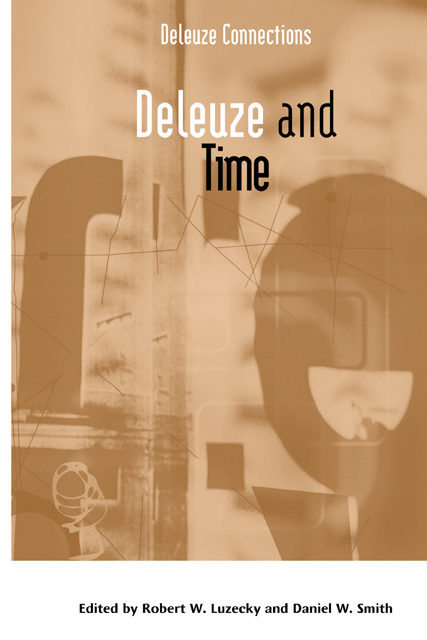Introduction: The Many Aspects of Duration
Published online by Cambridge University Press: 13 April 2023
Summary
In a text on the relation between the music of Pierre Boulez and the literature of Marcel Proust, Deleuze observes that the nameless narrator of Proust’s expansive masterpiece was a person haunted by time (2007: 297). Indeed, the same might be said of Deleuze himself. Temporality is a near constant theme from Deleuze’s earliest publications (on Hume, as well as a scintillatingly brief review of Simondon) to his final publication (‘Immanence: A Life’). Much like Bergson did with his unique concept of duration, Deleuze continually added further nuances to his philosophy of time. Temporality is a theme to which Deleuze continually returned throughout the twenty-five monographs that were published during his lifetime, in countless seminars and interviews, as well as in the texts co-authored with Félix Guattari – the two Capitalism and Schizophrenia volumes, the book on Kafka and What is Philosophy?
The ambit of Deleuze’s philosophy could scarcely be more expansive. In the Foreword to Éric Alliez’s Capital Times: Tales from the Conquest of Time, Deleuze explicitly affirms Plotinus’ claim that time is involved in the movements of the universe’s soul (1996: xii). A few lines later – through oblique reference to Fitzgerald, Iberall, the Stoics, Nietzsche, Kant and Shakespeare – Deleuze further characterises these movements as aberrant, in the sense that they are akin to the decoupling of a door flying off its hinges; time is a cosmic dice throw that affirms the actualisation of possibilities. In his two Cinema texts, as well as his other works on Bergson’s philosophy, Deleuze suggests that temporal movements involve the ongoing creation of virtual and actual modes of being. (Here, one might also observe a subtle modification of Étienne Souriau’s aesthetics.) The sheer number of texts that Deleuze published also hints at a further aspect of his philosophy of time: it is non-reducible to the thought of one key figure – to encounter Deleuze’s concept of time is to participate with a plurality of thinkers.
- Type
- Chapter
- Information
- Deleuze and Time , pp. 1 - 8Publisher: Edinburgh University PressFirst published in: 2023

